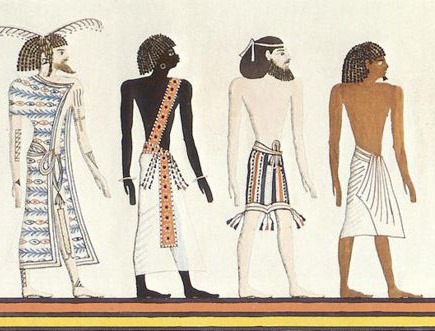Book of Gates on:
[Wikipedia]
[Google]
[Amazon]
The Book of Gates is an 
Sacred texts - Gate
(Images, hieroglyphs, transcription and English translation). {{DEFAULTSORT:Book Of Gates Ancient Egyptian funerary texts Egyptian mythology New Kingdom of Egypt
ancient Egyptian funerary text
The literature that makes up the ancient Egyptian funerary texts is a collection of religious documents that were used in ancient Egypt, usually to help the spirit of the concerned person to be preserved in the afterlife.
They evolved over time, ...
dating from the New Kingdom
New is an adjective referring to something recently made, discovered, or created.
New or NEW may refer to:
Music
* New, singer of K-pop group The Boyz
Albums and EPs
* ''New'' (album), by Paul McCartney, 2013
* ''New'' (EP), by Regurgitator ...
. It narrates the passage of a newly deceased soul
In many religious and philosophical traditions, there is a belief that a soul is "the immaterial aspect or essence of a human being".
Etymology
The Modern English noun '' soul'' is derived from Old English ''sāwol, sāwel''. The earliest att ...
into the next world, corresponding to the journey of the sun through the underworld
The underworld, also known as the netherworld or hell, is the supernatural world of the dead in various religious traditions and myths, located below the world of the living. Chthonic is the technical adjective for things of the underwo ...
during the hours of the night. The soul is required to pass through a series of 'gates' at different stages in the journey. Each gate is associated with a different goddess, and requires that the deceased recognise the particular character of that deity. The text implies that some people will pass through unharmed, but that others will suffer torment in a lake of fire.

Categories
The most famous part of the ''Book of Gates'' today refers to the different races of humanity known to theEgyptians
Egyptians ( arz, المَصرِيُون, translit=al-Maṣriyyūn, ; arz, المَصرِيِين, translit=al-Maṣriyyīn, ; cop, ⲣⲉⲙⲛ̀ⲭⲏⲙⲓ, remenkhēmi) are an ethnic group native to the Nile, Nile Valley in Egypt. Egyptian ...
, dividing them up into four categories that are now conventionally labelled "Reth" (Egyptians), "Aamu" ( Asiatics), "Nehesu" (Nubians
Nubians () ( Nobiin: ''Nobī,'' ) are an ethnic group indigenous to the region which is now northern Sudan and southern Egypt. They originate from the early inhabitants of the central Nile valley, believed to be one of the earliest cradles of ...
), and "Themehu" ( Libyans). These are depicted in procession entering the next world.
The text and images associated with the Book of Gates appear in many tombs of the New Kingdom, including all the pharaonic tombs between Horemheb
Horemheb, also spelled Horemhab or Haremhab ( egy, ḥr-m-ḥb, meaning " Horus is in Jubilation") was the last pharaoh of the 18th Dynasty of Egypt (1550–1295 BC). He ruled for at least 14 years between 1319 BC and 1292 BC. ...
(d.c. 1295 BC) and Ramesses VII (d.c. 1130 BC). They also appear in the tomb
A tomb ( grc-gre, τύμβος ''tumbos'') is a repository for the remains of the dead. It is generally any structurally enclosed interment space or burial chamber, of varying sizes. Placing a corpse into a tomb can be called ''immureme ...
of Sennedjem
Sennedjem was an Ancient Egyptian artisan. Sennedjem lived in Set Maat (translated as "The Place of Truth"), contemporary Deir el-Medina, on the west bank of the Nile, opposite Thebes, during the reigns of Seti I and Ramesses II. Sennedjem had ...
, a worker in the village of Deir el-Medina
Deir el-Medina ( arz, دير المدينة), or Dayr al-Madīnah, is an ancient Egyptian workmen's village which was home to the artisans who worked on the tombs in the Valley of the Kings during the 18th to 20th Dynasties of the New Kingdom ...
, the ancient village of artists and craftsmen who built pharaonic tombs in the New Kingdom
New is an adjective referring to something recently made, discovered, or created.
New or NEW may refer to:
Music
* New, singer of K-pop group The Boyz
Albums and EPs
* ''New'' (album), by Paul McCartney, 2013
* ''New'' (EP), by Regurgitator ...
.
The goddesses listed in the ''Book of Gates'' each have different titles, and wear different coloured clothes, but are identical in all other respects, wearing a five pointed star above their heads. Most of the goddesses are specific to the ''Book of Gates'', and do not appear elsewhere in Egyptian mythology
Egyptian mythology is the collection of myths from ancient Egypt, which describe the actions of the Egyptian gods as a means of understanding the world around them. The beliefs that these myths express are an important part of ancient Egyp ...
, and so it has been suggested that the ''Book of Gates'' originated merely as a system for determining the time at night, with the goddess at each gate being a representation of the main star appearing during the hour.
See also
*Book of the Dead
The ''Book of the Dead'' ( egy, 𓂋𓏤𓈒𓈒𓈒𓏌𓏤𓉐𓂋𓏏𓂻𓅓𓉔𓂋𓅱𓇳𓏤, ''rw n(y)w prt m hrw(w)'') is an ancient Egyptian funerary text generally written on papyrus and used from the beginning of the New Kingdom ( ...
* Gate deities of the underworld
References
Further reading
* Hornung, Erik; Abt, Theodor (editors): ''The Egyptian Book of Gates.'' Translated by Erik Hornung, in collaboration with Theodor Abt. Living Human Heritage Publications, Zurich 2014.External links
Sacred texts - Gate
(Images, hieroglyphs, transcription and English translation). {{DEFAULTSORT:Book Of Gates Ancient Egyptian funerary texts Egyptian mythology New Kingdom of Egypt